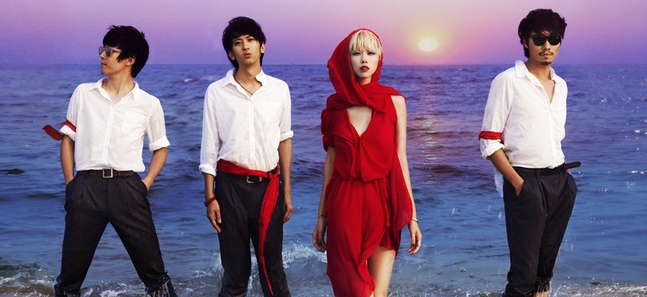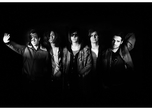Summer Sonic 2011: Queen Sea Big Shark interview
One of China’s biggest indie acts heads to Japan

Posted: Tue Aug 09 2011
Dressed in a silver catsuit and then later stripping down to a graphic, cartoon-style leotard, Queen Sea Big Shark’s Fu Han led her group through one of the most memorable sets at any of China’s summer festivals last year. Offering up her signature yelps and look-at-me stage moves, it was quite a contrast from the previous time we had encountered her, back in the studio, working on tracks for the band’s sophomore album, Wave.
Wearing a restrained black hoodie and jeans, her bleached hair streaking across her forehead, Fu was laying down vocals for the dance anthem ‘Comxxpuda’ while the rest of the band huddled over the mixing board. On that chilly April afternoon, she still looked every bit the rock star, but it was a bit like peeking behind the curtain in Oz – the illusion of magic is lost as the reality beneath the surface is revealed.
Since completing their self-titled debut album in 2007, Queen Sea Big Shark had continued to perform, solidifying their status as one of China’s biggest indie acts, but ultimately leaving fans clamouring for a follow-up. Now, they were finally delivering; but while the first album drew on new wave and surf rock influences, the latest material adds a different flavour.
‘We’re trying to create guitar, bass and drum parts that don’t sound real,’ guitarist Cao Pu explained during a break in the recording. ‘They sound more like they were produced by a robot or a computer.’ They’ve also added some Chinese elements into the mix, using synthesizers to create sounds similar to those made by traditional Chinese instruments.
‘They’re all really good songs, so it’s just been a question of presentation and making them sound as cool as we can,’ added Martin Rawlins, the Beijing-based English producer who had joined them in April last year.
When we left the band, they were pressed for time, working on two songs a day but still optimistic that their album would come out within the year. We meet again in early October as they prepare to launch Wave, and find the group eager to share their new sound with the world.
‘We wanted to try some new ideas and avoid focusing on vintage music, but we’re still deeply influenced by old music, like songs from The Beatles,’ Fu says. ‘I don’t think our life in the future will be only high-tech. It may trace back to more natural and original ideas.’
They are toying with a concept Fu dubs ‘future primitive’; they flat-out declare ‘We are the future’ (children and robots watch out!) on ‘Back to the Future’, a charged rocker with searing guitars that sees the band sounding like The Cramps’ little electro cousins.
‘Everyone’s house is a studio,’ says Fu, explaining their recording process. ‘We’re like four scientists.’ Cao picks up where she leaves off: ‘We finished lots of pieces at home and sent them to each other over the internet. Each member develops and adds their parts, and after that we do a rehearsal to make the piece sound more complete. This album is not a studio album; it’s more like a DIY effort.’
Parts of Wave were in the works in early 2009, and the band say they’ve taken more control with this album – drummer Xiao Wu did the post-production and mixing. They’ve created a collection of danceable, catchy electro-rock songs that show Queen Sea Big Shark have really matured since their debut. It’s not completely perfect – the mixing feels a tad rough and the vocal parts are a little weak in places – but it’s a fitting complement to their multi-sensory live shows.
Despite the band’s focus on the future, they retain a certain ambivalence toward technology; that much is evident from the album. ‘I used to love a boy. He’s living in the room. He got a boyfriend. His name is computer!’ purrs Fu on ‘Comxxpuda’. ‘I call it a fight with the computer,’ says Cao. ‘MIDI technology makes songwriting easy, but we insist on playing the instruments ourselves instead of using a computer program. Otherwise the music is written by a computer and not by us.’ Playing the new songs live, members often take up two instruments rather than relying upon pre-recorded tracks to recreate their studio work.
As for the album’s title, it could be taken as another oceanic reference to go along with the band’s name, but they say it has other meanings too. ‘It can also refer to a trend, a wave of people or the power of human beings,’ says Cao. ‘It’s about the development of society, which we visualised as a wave.’
The band themselves have developed over the years since forming in 2004, when they became associated with the so-called No Beijing movement that included bands such as Carsick Cars and Snapline. Fu gets nostalgic as she discusses the old days, back when fewer than 100 kids would turn up to a show and everyone would buy cheap beer someplace else and drink it outside. Still, she reasons, the band have more opportunities to grow now. They toured the US in 2009, opening for the band to which they are so often compared, the Yeah Yeah Yeahs.
‘We took a bus from the west coast to the east coast,’ recalls Cao. ‘The Yeah Yeah Yeahs show was in a big venue, which made me feel like I was dreaming, but some venues were really small – we only had two people in the audience in Seattle. That drew me back to reality pretty quick.’
In Detroit, they met an old hippy who – as old hippies often do – offered a little bit of been-there-done-that wisdom. ‘He said, “rock ‘n’ roll has died in the USA,”’ remembers bassist Wang Jinghan. ‘“But you guys from China warmed my heart. You taught us how to rock.”’
August 14, Island Stage, 5.20pm
Tweets
- About Us |
- Work for Time Out |
- Send us info |
- Advertising |
- Mobile edition |
- Terms & Conditions |
- Privacy policy |
- Contact Us
Copyright © 2014 Time Out Tokyo











Add your comment